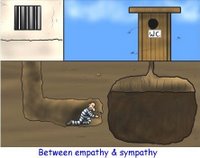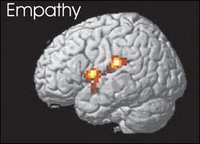I just received this response from Minister of Fisheries, Loyola Hearn. This is the letter I originally sent to Federal and Provincial Environment and Fisheries Ministers, and Opposition Critics. At least it's good to know that politicians are reading this.
Monday, June 26, 2006
Friday, June 23, 2006
World Cup Soccer: Nations Closer, at Least for a While
The World Cup of Soccer is a quadrennial event which draws billions of viewers worldwide for one month, for one thing. While a universal tournament like this may bring out countrys patriotism, political differences, and some hooliganism, it still unites the world in a way that few if any other event does to the same degree.
.
The FIFA World Cup Soccer (or "football", as Europeans call it) tournament is interesting not only because the greatest soccer players play to their highest potential, it is interesting because it is the most highly regarded single sport in the world, which links the world together through a common passion for the beautiful game, soccer ( Brazilian great Pelé coined the phrase). That is, it brings diverse peoples together in not just the physical gathering in venues across Germany, but also mentally, in the sense that people around the world have something in common. They have a love of this particular type of skill, an appreciation for individual players' attempts to reach the pinnacle of their God given abilities.
Winning the world cup is huge. It is to the winning country, what winning the Stanley Cup is to any professional hockey player. The live telecast of World Cup soccer is like watching the best mathematicians compete to solve a difficult problem the fastest, the best chess players, scrabble olympians, computer programmers, or 100 metre dash athletes, concentrate their mental, and physical energies to the greatest extent they can, to culminate in their most ultimate efforts.
For many players the World Cup of Soccer is the actual apex of their personal potential.
This event is possibly bigger than the Olympics. The Olympics draws billions of viewers, but for many different sporting events. The FIFA World Cup of Soccer tournament only has one, so you know that others around the world are tuning in to the same thing. As you watch a player's dazzling footwork skill or his clever moves, or quick intelligent thinking, you can imagine that others anywhere on the globe are often thinking the same thing, "wow, that move, that shot, that setup is clever, what a brilliant play!"
In a world where cultural, religious, political, race, and language differences too often build walls to communication and understanding, diverse peoples can mentally connect through a like appreciation or love of soccer. At a time where the daily news is filled with what seems like increasing tensions, hatred, violence and a distancing of mutual understandings, it is refreshing to see different peoples of the world share a common passion.
Language or culture is irrelevant when people see a smart play, they can mentally connect with the same expression of awe, wonderment, or disappointment - be on the "same page". This non-verbal knowingness is important because it allows an empathy or beginning of one between groups. Instead of walls, there are mental bridges built by means of a common love of soccer. In a world of wide ranging mindsets and terrorist extremism, world cup soccer is one of many commonalities that various peoples of the world share. For a short time, it may create a bond we wish existed in all realms of humanity - a mental or spiritual connectiveness with others in the world, through a universally loved recreation.
When the 2002 FIFA (Fédération Internationale de Football Association) world cup soccer was held in Korea/Japan, there were a watched cumulative total of 30 billion viewers, with 1 billion for the final between Brazil and Germany. There are 32 teams from 6 continents in the present tournament. More people are expected to watch this time because of the time zone it is happening from. Canada is not a competitor but one can still vicariously experience the thrill and excitement felt by those whose country just won a game, and the world cup.
Perhaps by 2010, there could be a Canadian team, or Newfoundland & Labrador player(s) actually in the competition. We certainly have alot of soccer talent, especially from the remarkable town of St. Lawrence, home of the Laurentians. But for now I am content to watch many evenly matched teams compete for the glory and the pride they will bring to their countries. Will it be Brazil, Holland, Iran, South Korea or one of the African nations this year? Where games are often won by one goal, it could be a surprise. It would be great to see an underdog win. In any event, it's interesting to see the pride and excitement of players and fans from around the world. If you're a fan, I'm sure you'll enjoy.
(for updates and scores, visit the official FIFA site)
.

The FIFA World Cup Soccer (or "football", as Europeans call it) tournament is interesting not only because the greatest soccer players play to their highest potential, it is interesting because it is the most highly regarded single sport in the world, which links the world together through a common passion for the beautiful game, soccer ( Brazilian great Pelé coined the phrase). That is, it brings diverse peoples together in not just the physical gathering in venues across Germany, but also mentally, in the sense that people around the world have something in common. They have a love of this particular type of skill, an appreciation for individual players' attempts to reach the pinnacle of their God given abilities.
Winning the world cup is huge. It is to the winning country, what winning the Stanley Cup is to any professional hockey player. The live telecast of World Cup soccer is like watching the best mathematicians compete to solve a difficult problem the fastest, the best chess players, scrabble olympians, computer programmers, or 100 metre dash athletes, concentrate their mental, and physical energies to the greatest extent they can, to culminate in their most ultimate efforts.
For many players the World Cup of Soccer is the actual apex of their personal potential.

This event is possibly bigger than the Olympics. The Olympics draws billions of viewers, but for many different sporting events. The FIFA World Cup of Soccer tournament only has one, so you know that others around the world are tuning in to the same thing. As you watch a player's dazzling footwork skill or his clever moves, or quick intelligent thinking, you can imagine that others anywhere on the globe are often thinking the same thing, "wow, that move, that shot, that setup is clever, what a brilliant play!"
In a world where cultural, religious, political, race, and language differences too often build walls to communication and understanding, diverse peoples can mentally connect through a like appreciation or love of soccer. At a time where the daily news is filled with what seems like increasing tensions, hatred, violence and a distancing of mutual understandings, it is refreshing to see different peoples of the world share a common passion.
Language or culture is irrelevant when people see a smart play, they can mentally connect with the same expression of awe, wonderment, or disappointment - be on the "same page". This non-verbal knowingness is important because it allows an empathy or beginning of one between groups. Instead of walls, there are mental bridges built by means of a common love of soccer. In a world of wide ranging mindsets and terrorist extremism, world cup soccer is one of many commonalities that various peoples of the world share. For a short time, it may create a bond we wish existed in all realms of humanity - a mental or spiritual connectiveness with others in the world, through a universally loved recreation.
When the 2002 FIFA (Fédération Internationale de Football Association) world cup soccer was held in Korea/Japan, there were a watched cumulative total of 30 billion viewers, with 1 billion for the final between Brazil and Germany. There are 32 teams from 6 continents in the present tournament. More people are expected to watch this time because of the time zone it is happening from. Canada is not a competitor but one can still vicariously experience the thrill and excitement felt by those whose country just won a game, and the world cup.
Perhaps by 2010, there could be a Canadian team, or Newfoundland & Labrador player(s) actually in the competition. We certainly have alot of soccer talent, especially from the remarkable town of St. Lawrence, home of the Laurentians. But for now I am content to watch many evenly matched teams compete for the glory and the pride they will bring to their countries. Will it be Brazil, Holland, Iran, South Korea or one of the African nations this year? Where games are often won by one goal, it could be a surprise. It would be great to see an underdog win. In any event, it's interesting to see the pride and excitement of players and fans from around the world. If you're a fan, I'm sure you'll enjoy.
(for updates and scores, visit the official FIFA site)
Monday, June 19, 2006
An Inconvenient Truth: Not All Gore
The film An Inconvenient Truth "starring" Al Gore may be just as dramatic as any movie out there. We've heard, read, and seen for years that global warming is here and is a growing problem which is already affecting climate, glaciers, and water supplies around the world, but this film clearly shows it. The show was very informative, visually and graphically interesting. There were a number of important points made in the film. The most important is that humanity is not doing enough to stop the problem of global warming. Excellent before and after pictures of various glaciers and lakes in the world were shown, and the amount they have receded was startling. Important lakes in the north of Africa, and Russia have practically dried up, the ice is thinning in the arctic, and more ice is falling from Antartic glaciers.
.
Another major point is that although people and governments have known this for years, northern hemisphere nations, the U.S. in particular, are the worst contributors to greenhouse gases. Back in 1990 I listened to two tapes by David Suzuki called "It's a Matter of Survival". In the tapes he described a scenario in 50 years from then, in which ocean levels around the world would rise to cover much of what is now beach front properties, communities, cities, and reaching 10 and in some cases 100 of miles inland. Gore's Inconvenient Truth covers this similiarly. But its excellent use of graphics makes it all more real.
One more major point was that many people seem to for various reasons, not consider the effects that global warming is having on the earth. Perhaps because it is a relatively gradual process which chips away at parts of our climate and environment insidiously and surely, but not overnight. We live in a consumer and product focused society where material things and consumption is seen to be the "American", "Canadian" or whatever nations dream (Canada was ranked 28th out of 30 industrial nations for its environment performance - Suzuki, Telegram, June 18, 2006). Living a simpler life is never advertised.
Most of society are not conditioned to conserve because that would mean not buying as much to keep the economic engines going. The ideas of recycling and conserving gas is out there, but it is up to us as individuals to do our parts, like more recycling, consuming less gas, etc. As a whole people have alot of power. The less need for some of the products that pollute then the less pollutants. It is also up to our governments to live up to pledges to cut back on emissions that contribute to the problem.
As we are never advised to actually save our money, not spend, only if it benefits banks, credit card companies, investors, etc., similiarly we are hardly encouraged to cut down on material purchases, transportation, and large consumption because it makes a small portion of society very rich. The idea of consuming is associated with buying happiness. Conversely if you do without then you're missing out on happiness. Of course we do need plenty of material things to live, and have comfort, however, the methods to manufacture them, manage, and recycle have much room for improvement.
I did not expect the theatre to be packed when I saw an Inconvenient Truth. It's not a typical movie, where most expect typical drama from lifes relationships, action, special effects, or pyro-technics. This was evident as I counted eight people in the theatre to see this show. However, the film must be creating a bit of a worry among big industry groups. Suzuki again, in a June 4 article (Telegram), points out that America's big free-market think-tanks ... funded largely by big industries, come up with all sorts of unusual claims and statements to justify the status quo and make sure that big, profitable, polluting industries continue to be big, profitable polluting industries. Two recent 30 second television ads in the U.S. say,
In the case of Aur Resources Duck Pond mining project, it appears they will take advantage of poor economic circumstances to insist that it's either their way or no way. They could be giving people a choice of how to handle toxic tailings but they are not doing so. They and other mining companies have done this around the world, and because some governments are so desperate for money, and need to show employment happening, that companies like Aur can take the easy way, and not have any ethical concerns for our environment. To some it may seem like, "hey, it's only one mining project," but again, it is a chipping away of part of a healthy environment which is gradually taking place, here, Canada and around the world. Bit by bit, pollution accumulates and contributes to the overall problem. Future generations will have more problems to cope with unless our generation and governments take action to stop the effects of global warming.
This film is worth seeing. There's alot of information, but it gives great information and visual evidence about how places are already being affected by the problem of global warming.
.

Another major point is that although people and governments have known this for years, northern hemisphere nations, the U.S. in particular, are the worst contributors to greenhouse gases. Back in 1990 I listened to two tapes by David Suzuki called "It's a Matter of Survival". In the tapes he described a scenario in 50 years from then, in which ocean levels around the world would rise to cover much of what is now beach front properties, communities, cities, and reaching 10 and in some cases 100 of miles inland. Gore's Inconvenient Truth covers this similiarly. But its excellent use of graphics makes it all more real.
One more major point was that many people seem to for various reasons, not consider the effects that global warming is having on the earth. Perhaps because it is a relatively gradual process which chips away at parts of our climate and environment insidiously and surely, but not overnight. We live in a consumer and product focused society where material things and consumption is seen to be the "American", "Canadian" or whatever nations dream (Canada was ranked 28th out of 30 industrial nations for its environment performance - Suzuki, Telegram, June 18, 2006). Living a simpler life is never advertised.
Most of society are not conditioned to conserve because that would mean not buying as much to keep the economic engines going. The ideas of recycling and conserving gas is out there, but it is up to us as individuals to do our parts, like more recycling, consuming less gas, etc. As a whole people have alot of power. The less need for some of the products that pollute then the less pollutants. It is also up to our governments to live up to pledges to cut back on emissions that contribute to the problem.
As we are never advised to actually save our money, not spend, only if it benefits banks, credit card companies, investors, etc., similiarly we are hardly encouraged to cut down on material purchases, transportation, and large consumption because it makes a small portion of society very rich. The idea of consuming is associated with buying happiness. Conversely if you do without then you're missing out on happiness. Of course we do need plenty of material things to live, and have comfort, however, the methods to manufacture them, manage, and recycle have much room for improvement.
I did not expect the theatre to be packed when I saw an Inconvenient Truth. It's not a typical movie, where most expect typical drama from lifes relationships, action, special effects, or pyro-technics. This was evident as I counted eight people in the theatre to see this show. However, the film must be creating a bit of a worry among big industry groups. Suzuki again, in a June 4 article (Telegram), points out that America's big free-market think-tanks ... funded largely by big industries, come up with all sorts of unusual claims and statements to justify the status quo and make sure that big, profitable, polluting industries continue to be big, profitable polluting industries. Two recent 30 second television ads in the U.S. say,
... The fuels that produce CO2 have freed us from a world of backbreaking labour. Now politicians want to label carbon dioxide a pollutant. Imagine if they succeed. What would our lives be like then?... They call it pollution. We call it life.The good news is that more people are becoming aware of global warming issues, and angry. For example, a recent Canadian study showed that children had more toxins in their bodies than their parents. Several mothers interviewed on CBC were alarmed at this finding. The same study showed evidence that pollutants which were banned after some children were born, were still found in their bodies because it was still transmitted from the mother to child. Like the effects of nicotine and trans fats had been covered up for years, how many more contaminants exist around us, or are consumed by us, that do harm to our bodies, are still being cover up? Companies who manufacture dangerous substances, and pollute the environment want the status quo to remain. However, it is not in our best interest, only their's.
In the case of Aur Resources Duck Pond mining project, it appears they will take advantage of poor economic circumstances to insist that it's either their way or no way. They could be giving people a choice of how to handle toxic tailings but they are not doing so. They and other mining companies have done this around the world, and because some governments are so desperate for money, and need to show employment happening, that companies like Aur can take the easy way, and not have any ethical concerns for our environment. To some it may seem like, "hey, it's only one mining project," but again, it is a chipping away of part of a healthy environment which is gradually taking place, here, Canada and around the world. Bit by bit, pollution accumulates and contributes to the overall problem. Future generations will have more problems to cope with unless our generation and governments take action to stop the effects of global warming.
This film is worth seeing. There's alot of information, but it gives great information and visual evidence about how places are already being affected by the problem of global warming.
Thursday, June 15, 2006
Them Days Fundraiser
- The notice below was sent out from Teresa Best of the Native Liaison Office, MUN.
JUNE 14, 2006 - Them Days Archives & Publications will be hosting a fundraiser evening on Sunday, June 25, at 7 p.m. at the Inco Innovation Centre in St. John's.
The event will help raise awareness of Them Days magazine as well as raise funds for a much-needed archive room in which to store the vast amount of rare and valuable photos, negatives, taped interviews, books, official records, genealogies and numerous files of anything and everything to do with Labrador.
Them Days Editor and Curator, Lorne Hollett, is inviting everyone to this informative evening, which will showcase early photos of Northern Labrador.
Judge Jim Igloliorte will be guest speaker at the event and will tell of his first-hand experience of Labrador.
"Thirty-one years ago, the late Doris Saunders was hired to prepare a book of stories as told by the elders of Labrador", said Mr. Hollett Doris saw the potential of something great and established an on-going quarterly publication, which we still have today."
Them Days Archives & Publications has been called, "... the greatest source of Labrador archival material in the world."
"I am encouraging everyone to attend this event, as we need the public's support to help us achieve our goal of a proper archive, so that our valuable collection is kept safe for years to come," said Mr. Hollett.
Refreshments will be provided and every person who attends will have their name entered in a draw for a gift set of back issues of Them Days.
For more information on this event, contact Them Days at (709) 896-8531.
A Few Thoughts on Empathy
Quotes on empathy
1. The greatest virtue of Dr. (Martin Luther) King - to quote from his tribute to Dr. W.E.B. DuBois - was his committed empathy with all the oppressed and his divine dissatisfaction with all forms of injustice.
2. He (Dr. King) did not criticize white people. He understood they were as they were because of their backgrounds and experience. He appealed to whites as good neighbors:
The good neighbor looks beyond the external accidents and discerns those inner qualities that make all men human and, therefore, brothers.
He was saturated with empathy and he requested that whites feel the same empathy towards blacks. He was merely requesting that white Americans live up to their professed ideals. King proclaimed:
"We must learn to live together as brothers or perish together as fools."
3. "The most valuable things in life are not measured in monetary terms. The really important things are not houses and lands, stocks and bonds, automobiles and real state, but friendships, trust, confidence, EMPATHY, mercy, love and faith."
- Bertrand Russell
4. "I do not ask how the wounded person feels. I simply become that wounded person."
- Winston Churchill
Tuesday, June 13, 2006
Hare & Gone
I just went out to take a couple of close up flower shots to try out my new digital camera, when I was treated to the sight of a wild rabbit.

It hopped across my yard to a dogberry tree, stayed there for about 4 minutes, nibbling on leaves.

You can't beat nature. The odd squirrel comes around but this rabbit is not a common sight. I guess it's safe to say summer is here.


It hopped across my yard to a dogberry tree, stayed there for about 4 minutes, nibbling on leaves.


You can't beat nature. The odd squirrel comes around but this rabbit is not a common sight. I guess it's safe to say summer is here.
Subscribe to:
Comments (Atom)




